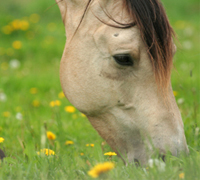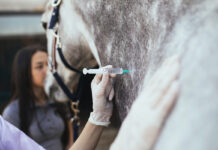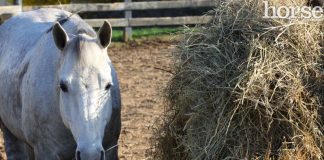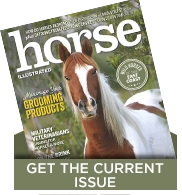 Dr. Kristina Hiney, PhD, Equine Nutrition Advisor for Omega Fields®, has prepared a series of Seasonal Tips which can be of great help to the horse owner transitioning their horses from one season to another.
Dr. Kristina Hiney, PhD, Equine Nutrition Advisor for Omega Fields®, has prepared a series of Seasonal Tips which can be of great help to the horse owner transitioning their horses from one season to another.
- Schedule your spring check-up with your veterinarian in order to get your spring shots before mosquito season. Many diseases in horses are transmitted by mosquitoes, including Eastern, Western and Venezuelan encephalomyelitis, as well as West Nile disease. Read more about equine vaccination guidelines >>
- Have your horse’s Coggins test performed, especially if you plan to travel. Coggins tests are performed annually in order to test for carriers of Equine Infectious Anemia. This is a disease which has no cure or vaccine available and is also transmitted by mosquitoes. The only route of control available is to identify carrier horses which may spread the disease to other horses via blood sucking insects.
- Check all of your fences for winter damage. Freezing and thawing of the ground can cause posts to “heave”. This may result in downed rails, loose mesh or high tensile fences no longer having high tension. Be sure to re-stretch any fences that may have become loose as these are actually extremely dangerous. Horses may tangle themselves quite easily in loose wires. Read more on fence maintenance >>
- If you use electric fences, check your chargers. As the grass begins to grow, the temptation to leave the fenced in area for greener pastures may intensify. Read more on electric fencing >>
- Now is the time to clean and check your tack for wear, potential weak spots, rotting etc. before riding season gets into full swing.
- Before heading down the road, be sure to test your trailer’s lights, brakes, and floors. Certainly your wiring may be damaged or corroded from snow and salt. You do not want to find out in mid-drive! Read more on trailer safety >>
- Avoid sudden turnout to lush, green pastures. Use a slow adaptation to grazing, introducing your horse a few hours at a time. Be especially careful if your horse is an easy keeper, who tends to deposit fat along the crest of his neck, abdomen and tailhead. He may be a horse with metabolic syndrome and thus be susceptible to laminitis with exposure to spring grasses.
- Consider building a sacrifice area or having a paddock for turnout. Not only can you use this to limit your horse’s time on pasture, but also when it is wet and your horse’s hooves may tear up the sod in the pasture while bucking and playing in the fresh spring air!
- Begin your exercise program slowly! If you have not done much riding over the winter, your riding partner will not be in shape. Remember what you feel like when hitting the gym after a long time away. Your horse gets sore too! Read more on safe horse conditioning >>
To read the other Seasonal Tips from Dr. Kris Hiney, as well as her monthly articles concerning equine health and training, sign up to receive Omega Fields’ monthly Health-E-Letter at omegafields.com. It’s free, delivered to your email address, and contains exciting product discounts, up-to-date research, health-related news, interesting resources, and new product development, along with thought provoking feature stories.







Good points to remember.